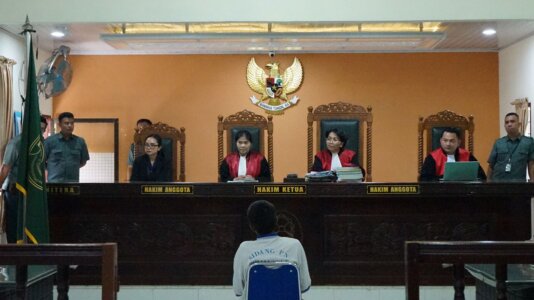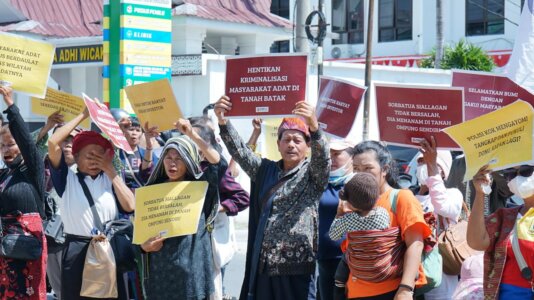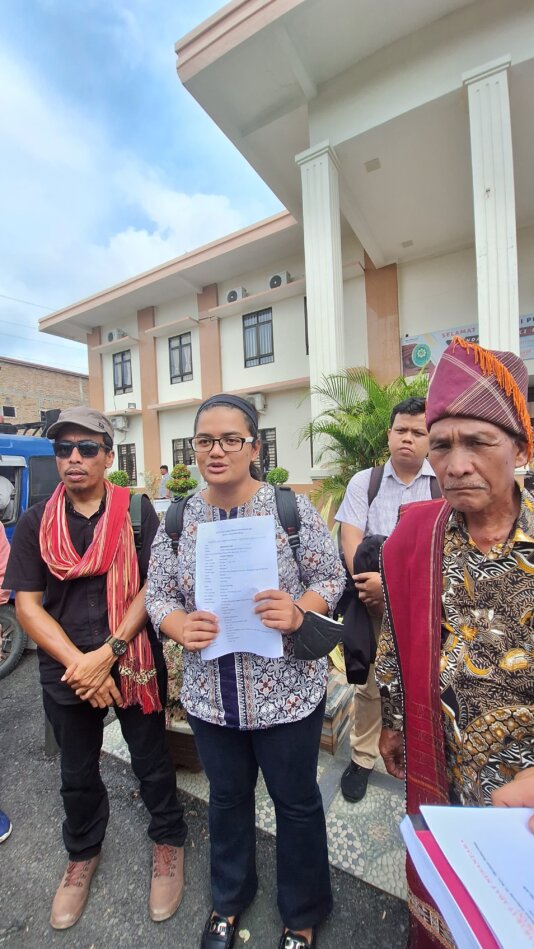- About
- Topics
- Picks
- Audio
- Story
- In-Depth
- Opinion
- News
- Donate
- Signup for our newsletterOur Editors' Best Picks.Send
Read, Debate: Engage.
| September 06, 2024 | |
|---|---|
| topic: | Indigenous people |
| tags: | #Indonesia, #indigenous rights, #indigenous lands, #corruption |
| located: | Indonesia |
| by: | Tonggo Simangunsong |
At the evening trial held at the State Court of Simalungun, North Sumatera, on 14 August, two of the three judges found Sorbatua Siallagan guilty. The 65-year-old was sentenced to two years and six months in prison for occupying concession land belonging to PT. Toba Pulp Lestari (TPL), a subsidiary of the Indonesian pulp and paper giant, Royal Golden Eagle.
"My father is not guilty. The trial cannot prove that my father burned grass in the concession land as alleged to him," Sorbatua’s daughter, Jerni Elisa Siallagan, told FairPlanet.
Sorbatua, the leader of the Ompu Umbak Siallagan indigenous community at Dolok Parmonangan, Simalungun regency, was arrested in March this year after TPL reported him to police for cultivating ginger, chilli, avocado and corn in 2022 in its designated concession area. The trial against him was held two months after his arrest, and the verdict was delivered three months after the initial trial.
The conflict between the indigenous community and TPL began in 2018 when the paper maker expanded its eucalyptus plantation into the community's 820-hectare customary land. The community claims their land was wrongly designated as state forest by the government, which then granted the company a license for its use.
"We have lived on our customary land for seven generations since the 1700’s," Siallagan told the prosecutors, according to footage reviewed by FairPlanet.
The prosecutor charged Sorbatua Siallagan based on witness testimony under Law No. 2 of 2020, part of the controversial Job Creation Law passed on 5 October, 2020, during the Jokowi era. The law stipulates that occupying or controlling forests illegally constitutes an unlawful act.
Siallagan is not only the indigenous leader the company sued for defending their land. Three months after his arrest and trial, dozens of indigenous people of Sihaporas, also in Simalungun regency, were intimidated by police in the early morning on 22 July.
Ten of them were arrested, and after being taken to the Simalungun police department, four - Jonny Ambarita, Thomson Ambarita, Giofani Ambarita and Parando Tamba - were prosecuted. They were accused of occupying TPL's concession area and assaulting its workers.
The criminalisation of indigenous communities in North Sumatra is not a new issue. It dates back to the 1980s when the pulp company, now expanding its eucalyptus plantations, was granted concessions by the Indonesian government.
According to Legal Aid and Advocacy for People of North Sumatra (BAKUMSU), over the past two decades, 93 indigenous people in the vicinity of TPL's concession area have been criminalised and 39 have been imprisoned.
Meanwhile, AMAN Tano Batak (Batak Land) and KSPPM (an indigenous rights foundation operating in North Sumatra) found that TPL has occupied 25,000 hectares (65,000 acres) of indigenous land without consent.
"Their customary land is their livelihood - the source of their income by sapping incense in forest and cultivating their land for agriculture," Hengky Manalu, a campaigner at AMAN Tano Batak, told FairPlanet.
Last July, Mangitua Ambarita, 68, joined rallies outside the State Court of Simalungun along with dozens of indigenous community members, demanding justice for the four individuals arrested by police and for Sorbatua Siallagan, who is facing trial.
"We are not an illegal community that cultivated illegal land; we cultivated on our ancestors’ land!" the leader of the Ompu Mamontang Laut indigenous community living in Sihaporas village, Simalungun regency, belted at the rally.
The Ompu Mamontang Laut Ambarita indigenous community once held 2,053 hectares of customary land, but since TPL expanded its eucalyptus plantation in the Simalungun region in 1992, they have frequently clashed with the company. Today, only 500 hectares of their customary land remain, now used for villages and agriculture.
Since the fall of the Suharto regime in 1998, the community has been fighting to reclaim their land, with at least four members being criminalised and imprisoned. Suharto, the authoritarian president who ruled for 32 years, suppressed citizens' ability to express their opinions and protest against the state. Mangitua himself was sentenced to one year in prison in 2004 for allegedly occupying TPL concession land.
"Our descendants have lived here since the 1800’s [...] we have been living in the land for 11 generations. We have made so many efforts by following the government rules to prove our identity, but never got any recognition," Mangitua told lawmakers during a meeting in Simalungun in July.
Following demonstrations in front of the North Sumatra House of Representatives in Medan in 2000, the community submitted a proposal for recognition to the Ministry of Environment and Forestry and to the Simalungun Regency.
These actions prompted the ministry to send officers to visit their village, where the community presented evidence, including ancestral graves, heirlooms and bamboo planted by previous generations.
"We have proposed legally by following the government procedure, but the government still has not recognised us as indigenous community," Mangitua said.
Sihaporas and Dolok Parmanongan are two of 31 of indigenous communities in North Sumatra facing conflict, according to the National Commission of Human Rights.
Similar to the Sihapora community, which has not been recognised by the Simalungun Regency administration, Sorbatua Siallagan and his people submitted a proposal for recognition as an indigenous community to the Indonesian government in 2019, but they have yet to receive acknowledgment.
According to Hengky Manalu, the conflict began when the government designated the indigenous land as state forest without the community's consent and then licensed it to the company.
This issue, Manalu said, has led the community to oppose the company's operations on their customary land, which pollutes their water source and deforests their ancestral forest.
Sorbatua’s case, according to Hengky Manalu, demonstrates that the judges tend to favour the company over the indigenous people."The state should respect the indigenous rights and the establishment of their customary land as a state forest has no legal standing yet," he told FairPlanet.
Roganda Simanjuntak, an indigenous rights activist and former chairman of AMAN Tano Batak, stated that the criminalisation of indigenous communities would not have occurred if the government had passed the Indigenous people bill and if there were political will from the regency administration to grant them legal recognition.
"Now what happens is that there is not a law to protect indigenous rights and it makes them very vulnerable to criminalisation," Simanjuntak told FairPlanet.
Meanwhile, another solution has been proposed to the Ministry of Environment and Forestry since 2018: to revise the concession permit that overlaps with indigenous land.
However, there has been no clear response from the minister so far, Simanjuntak added. He suspects this may be due to the influence of oligarchs or investor intervention.
The rights of indigenous people in Indonesia are enshrined in the Constitution. Their rights were also reinforced by the 2012 Constitution Court decision, ruling No. 35, which states that indigenous land cannot be classified as state forest.
Tongam Panggabean, Executive Director of BAKUMSU, noted that in other regions, such as the case of Pandumaan-Sipitu Huta, it has been effective for indigenous communities to gain the government's attention and initiate action to revise a concession. However, in trials involving the criminalisation of indigenous people, judges almost never use this as a legal basis before reaching a verdict.
"That is why in case of criminalisation of indigenous community, it is important to make a boundary rule from the Supreme Court as a guidance for judges to judge cases related to indigenous rights," he told FairPlanet. This, he believes, would ensure that judges have a better understanding of indigenous rights and reference the Constitutional Court decision as part of the legal framework before delivering a verdict.
Images by AMAN Tano Batak & BAKUMSU.
By copying the embed code below, you agree to adhere to our republishing guidelines.


